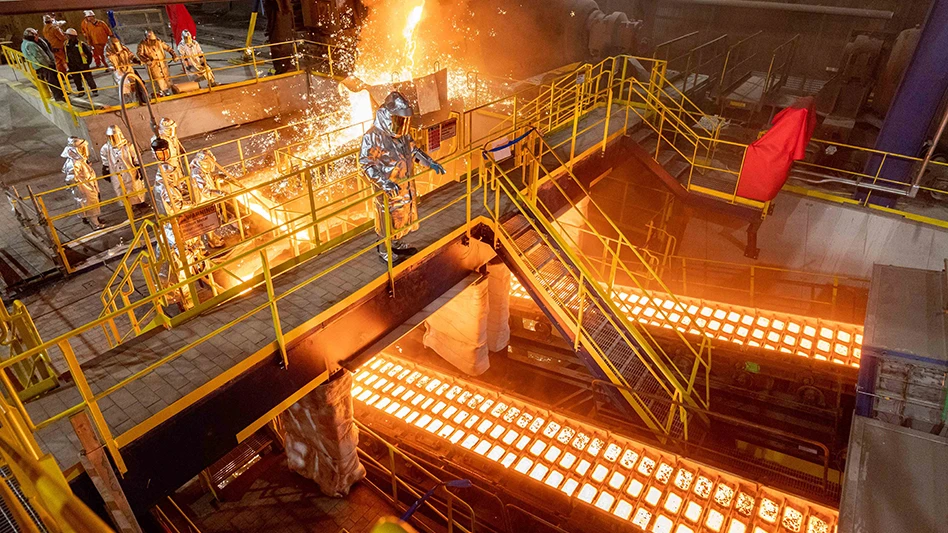
Photo courtesy of U.S. Steel Corp.
President Joe Biden has issued a statement expressing opposition to the sale of Pittsburgh-based United States Steel Corp. to Nippon Steel Corp., which is based in Japan.
A three-sentence statement dated March 14 says, “U.S. Steel has been an iconic American steel company for more than a century, and it is vital for it to remain an American steel company that is domestically owned and operated.
“It is important that we maintain strong American steel companies powered by American steelworkers. I told our steelworkers I have their backs, and I meant it.”
The following day, Nippon Steel released a statement, saying in part its “transaction delivers clear benefits to U. S. Steel, union workers, the broader American steel industry and American national security.”
The future of U.S. Steel as an independent company came into question starting last August, when rival steel producer Cleveland-Cliffs disclosed it had put together a bid to buy the company.
Cleveland-Cliffs CEO Lourenco Goncalves received support from the United Steel Workers (USW) for that bid. However, some steel buyers in North America expressed reservations about a combination that would put every blast furnace/basic oxygen furnace mill in the U.S. in the hands of one company.
Last December, U.S. Steel’s board of directors announced it had accepted a $14.9 billion bid from Nippon Steel instead. “This transaction realizes the tremendous value today in our company and is the result of our board of directors’ comprehensive and thorough strategic alternatives process,” U.S. Steel President and CEO David B. Burritt said at the time.
That bid also has attracted opposition, initially from a handful of senators and congressional representatives in steel-producing, iron-mining or metallurgical coal-mining states.
That opposition seems to have gained momentum, with election-year politics likely one of the reasons.
Although negotiators from Nippon Steel and the USW reportedly met to find common ground, the road to Nippon Steel finalizing the acquisition could be lengthier than it anticipated.
Critics of the deal have cited national security aspects of overseas ownership as a concern. Although Japan has been an ally of the U.S. since 1946, a CNN report on the merger claims the Biden administration is concerned about some of Nippon’s assets in China.
The Nippon Steel website lists nine facility or office locations in China, including one that is a joint venture or allied effort with Baoshan Iron & Steel (Baosteel), China’s largest steelmaker.
Biden’s brief statement refers specifically to workers, however, with sizable U.S. Steel facilities and supplier networks located in swing states such as Pennsylvania and Michigan.
Regarding threats to employment, Nippon Steel said March 15 it intends to invest in its American steelmaking assets, not divest from them.
“Our aim is to bolster and grow U. S. Steel in the U.S. market in a way that prioritizes its talented employees, and we have provided significant commitments to the USW in our continued efforts to reach a mutually agreeable resolution,” the company says. “These include job security, pension security, capital investment, technology sharing, financial reporting and the ability to enforce contractual obligations postclosing.”
Bloomberg and New York Times analyses of the transaction and reactions to it spell out a potential scenario of conducting a lengthy review that would serve the purpose of delaying a decision until after votes are counted this November.
*This item was updated March 18 to add comments from Nippon Steel.
Latest from Recycling Today
- BMW Group, Encory launch 'direct recycling’ of batteries
- Loom Carbon, RTI International partner to scale textile recycling technology
- Goodwill Industries of West Michigan, American Glass Mosaics partner to divert glass from landfill
- CARI forms federal advocacy partnership
- Monthly packaging papers shipments down in November
- STEEL Act aims to enhance trade enforcement to prevent dumping of steel in the US
- San Francisco schools introduce compostable lunch trays
- Aduro graduates from Shell GameChanger program





